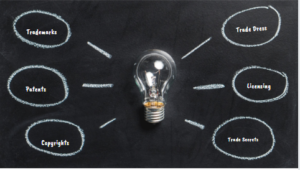The McHattie Law Firm is uniquely equipped to deal with modern businesses’ most valuable asset — its intellectual property — and to manage it with a strategic legal approach in the US. From creation to licensing to sale, we stand ready, willing and able to serve your needs, developing strategies for your opportunities and solutions to your problems. We have the experience to help you obtain your US and global IP protection, for an invention, the expression of an original idea, a trademark, or software efficiently and effectively, and to thereafter help you earn a return and profit from that investment. Read below for a basic overview of 12 important aspects of Intellectual Property.
On the first day of IP Christmas, my lawyer gave to me:
Intellectual Property Protection
Intellectual Property needs to be protected, but first, understood.  Intellectual Property is a creation of the mind. It’s “property” that has come exclusively from one’s “intellect.” IP can include inventions; artistic and literary works; names; images and designs; and symbols.
Intellectual Property is a creation of the mind. It’s “property” that has come exclusively from one’s “intellect.” IP can include inventions; artistic and literary works; names; images and designs; and symbols.
Intellectual Property is protected by law, which includes patents, trademarks, copyright and more. Protecting your IP keeps you and your creations safe by providing you with legal rights. By understanding Intellectual Property and implementing legal in its safeguarding, you not only nurture innovation, you will undoubtedly ensure its success.
On the second day of IP Christmas, my lawyer gave to me:
TWO Patents
Patents are the best protection you can get for a new and novel product, method, and/or design. A patent gives its inventor the right to stop others from making, using or selling the claimed invention throughout the United States. International patent protection is also available.
 Patents are obtained through the U.S. Patent and Trademark Office. This procedure may take several years and can be complex. You typically need a patent lawyer to draw up the patent application for you.
Patents are obtained through the U.S. Patent and Trademark Office. This procedure may take several years and can be complex. You typically need a patent lawyer to draw up the patent application for you.
Our licensed patent attorneys are equipped to give you practical and common sense answers to your technical and legal questions. We will advise you from concept through the prosecution of your application to selling or licensing your patent to others, and protecting it from others’ infringing use.
On the third day of IP Christmas, my lawyer gave to me:
THREE Trademarks
A trademark includes any word, name, mark, sound, color, scent, and other commercial signals that businesses and individuals use to identify their products and services. Trademarks help to build brand awareness and goodwill.
A trademark can provide an additional layer of protection, since a company’s name is often closely tied to its product. Trademark law seeks to protect the consumer from confusion as to the source of a product or service. You can only pursue legal avenues if your trademark is  registered. As with a patent application, trademark registration helps to establish the date your idea came into use. These dates will be crucial in the event someone tries to dispute ownership of your idea.
registered. As with a patent application, trademark registration helps to establish the date your idea came into use. These dates will be crucial in the event someone tries to dispute ownership of your idea.
The attorneys at McHattie Law can help guide your selection of a strong mark, research its availability, assist with the registration process, and help you protect it for years to come.
On the fourth day of IP Christmas, my lawyer gave to me:
FOUR Copyrights
The United States copyright law protects “original works of authorship,” fixed in a tangible medium including literary, dramatic, musical, artistic, and certain other intellectual works. This protection is available to both published and unpublished works. A copyright protects the expression of an original idea by granting the copyright owner the exclusive right to copy, make derivative works of, distribute, perform, and/or display that particular expression of the idea.
We are adept at providing our clients with comprehensive copyright services, including registration, renewal, assignment, and enforcement of your copyright, in addition to explaining the scope of protection that your copyright secures.
On the fifth day of IP Christmas, my lawyer gave to me:
FIVE Trade Secrets
A trade secret is generally defined as confidential business information which provides the business with a competitive edge. A trade secret right allows the proprietor of the right to take action against anyone who breaks an agreement or confidential relationship, or who defrauds or uses other improper means to obtain secret information. The unauthorized use of such information by persons other than the holder is regarded as an unfair practice and a violation of the trade secret.
On the sixth day of IP Christmas, my lawyer gave to me:
SIX Licensing Agreements
Under Intellectual Property law, you have the exclusive right to use or reproduce your work. In some cases, you may wish to allow others to use it. In order to maintain control over and protect your intellectual property, you should create a license agreement. A license is a contract that allows you to make a profit by granting permission to another party to produce and sell goods, to use a trademark or patented technology, or to display work for a fee or other consideration.
In the event that someone attempts to infringe upon your IP rights, a license will allow you to file suit to enforce your rights and to seek monetary damages. Intellectual property is a valuable asset; protect it with a licensing agreement. (Learn more The Importance of IP for Startups: Licensing Agreements)
On the seventh day of IP Christmas, my lawyer gave to me:
SEVEN NDAs
An NDA, meaning non-disclosure agreement, will help safeguard non-public business
information such as proprietary and confidential information, and trade secrets. It should be used with contractors, investors and business partners in which the parties agree not to disclose information covered by the agreement. Nevertheless, it is important to note that many financiers will hesitate to sign an NDA before you speak with them. This situation may be handled by providing a written confidentiality statement identifying what you consider to be proprietary, confidential, and trade secret.
On the eighth day of IP Christmas, my lawyer gave to me:
EIGHT Cease and desist letters
A Cease & Desist Letter is often times the first step to asking an individual, or a business, to stop engaging in unlawful and unwanted behavior, such as intellectual property infringement. The holder of an intellectual property right such as a copyrighted work, a trademark, or a patent, will send this to formally ask the recipient to immediately stop (“cease”) engaging in such behavior and no longer continue (“desist”) engaging in such behavior in the future. Otherwise, legal action will be taken because the behavior is harming or interfering with the sender’s legal rights. The letter may merely contain a licensing offer, or may be an explicit threat of a lawsuit. A cease and desist letter often triggers licensing negotiations, and is a frequent first step towards litigation.
On the ninth day of IP Christmas, my lawyer gave to me:
NINE International Protection Applications
 Since the rights granted by a U.S. intellectual property extend only throughout the United States and have no effect in a foreign country, an inventor who wishes protection in other countries must apply for those intellectual property rights in each of the other countries.
Since the rights granted by a U.S. intellectual property extend only throughout the United States and have no effect in a foreign country, an inventor who wishes protection in other countries must apply for those intellectual property rights in each of the other countries.
For example, almost every country has its own patent and trademark law, and a person desiring a patent or trademark in a particular country must make an application in that country, in accordance with the requirements of that country. Similarly, local laws apply to copyrights too, and other forms of intellectual property in each jurisdiction. There is protection for intellectual property around the world and you should use it to your advantage.
On the tenth day of IP Christmas, my lawyer gave to me:
TEN Litigations
 Litigation is the term used to describe proceedings initiated between two opposing parties to enforce or defend a legal right. Litigation is typically settled by agreement between the parties, but may also be heard and decided by a jury or judge in court.
Litigation is the term used to describe proceedings initiated between two opposing parties to enforce or defend a legal right. Litigation is typically settled by agreement between the parties, but may also be heard and decided by a jury or judge in court.
The McHattie Law Firm has represented a diverse group of litigation clients in both state and federal courts, as well as in mediations, arbitrations, administrative proceedings, and proceedings before the Trademark Trial and Appeal Board. Our focus is on the end result, so we assess the risks and benefits of litigation at the outset, with the goal of resolving disputes as efficiently and amicably as possible.
On the eleventh day of IP Christmas, my lawyer gave to me:
ELEVEN Durations
On the twelfth day of IP Christmas, my lawyer gave to me:
TWELVE Royalty Payments
 Presents arrive! A royalty is a payment to an owner for the use of property, such as patents, trademarks, or copyrighted works. A royalty payment is made to the legal owner of the intellectual property by those who use the patented, copyrighted or trademarked work for ongoing purposes of generating revenue. In most cases, royalties are designed to compensate the owner for the asset’s use, and are legally binding.
Presents arrive! A royalty is a payment to an owner for the use of property, such as patents, trademarks, or copyrighted works. A royalty payment is made to the legal owner of the intellectual property by those who use the patented, copyrighted or trademarked work for ongoing purposes of generating revenue. In most cases, royalties are designed to compensate the owner for the asset’s use, and are legally binding.


